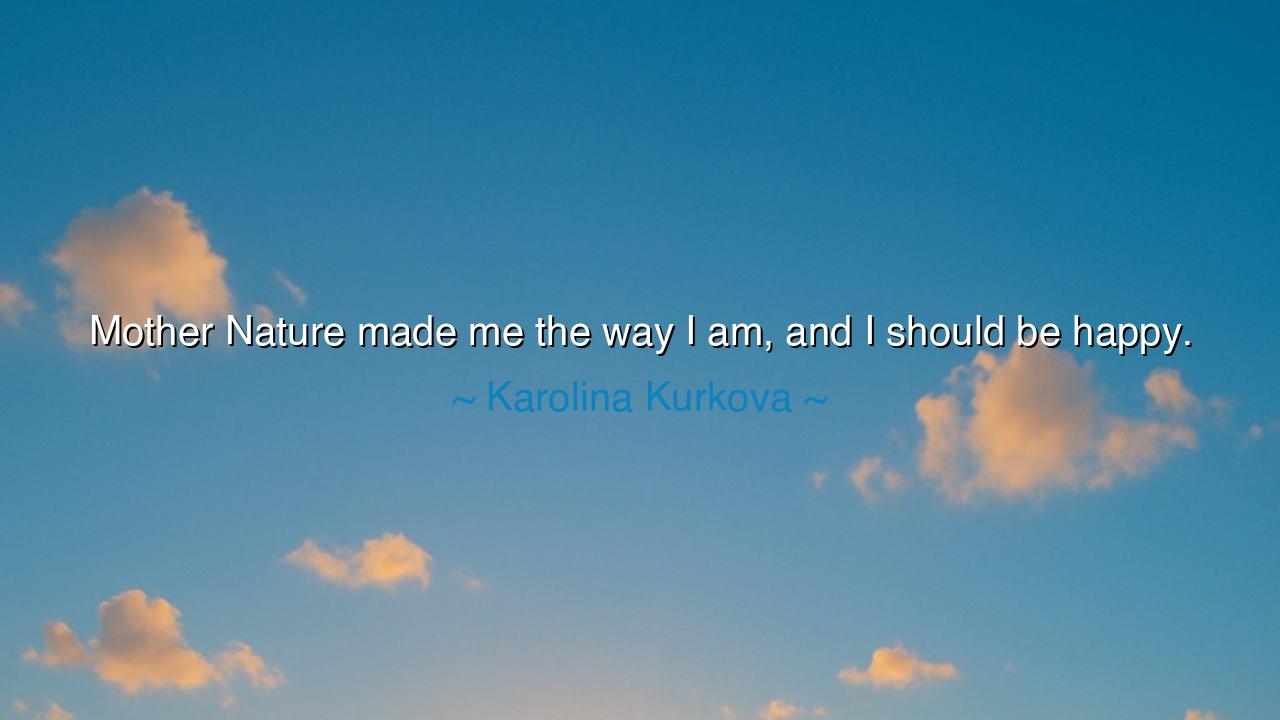
Mother Nature made me the way I am, and I should be happy.






Hear the words of Karolina Kurkova, who spoke not with arrogance but with the wisdom of self-acceptance: “Mother Nature made me the way I am, and I should be happy.” In this simple confession lies the ancient teaching that to be at peace with oneself is the foundation of strength. For the hand of Mother Nature, eternal and impartial, molds each of us differently—some tall, some small, some with gifts of beauty, some with gifts of endurance, some with scars, some with radiance. To reject what she has made is to reject life itself, but to accept and be happy is to walk in harmony with her will.
This wisdom is older than empires. The Stoics of Greece and Rome declared that man’s greatest task was to live in agreement with nature. Epictetus, born a slave and lame from birth, said, “Do not demand that events happen as you will, but let them happen as they do, and you will have peace.” Though he was denied freedom, denied health, he found joy in aligning his heart with what nature had given him. Kurkova, though she spoke as one blessed with beauty, echoes this same eternal chord: happiness does not come from fighting against what we are, but from embracing it.
The modern world tempts us otherwise. It whispers that we are never enough—that our bodies must be reshaped, our faces altered, our identities denied. It breeds discontent, selling us the false promise that joy lies always in becoming someone else. But this endless striving leaves the soul restless. Against this tide, Kurkova’s words stand as a clear rebuke: “I should be happy.” Not in some imagined perfection, but in the truth of how Mother Nature shaped her, in the acceptance of being.
Consider also Abraham Lincoln, a man mocked in his youth for his awkward frame and rough features. Yet he accepted himself, and in time, the very presence that others ridiculed became a symbol of honesty, humility, and strength. Had he despised himself, he might have been broken; but by walking tall in his own nature, he became the leader who guided a nation through its darkest trial. His life teaches us that greatness is not in denying what we are, but in living fully within it.
Kurkova’s words also remind us that happiness is not a gift bestowed from outside, but a choice from within. We cannot control how Mother Nature has shaped us, but we can control whether we curse her work or bless it. To choose gratitude is to free the spirit; to choose bitterness is to enslave it. The happiest souls are not those who possess all they desire, but those who look at themselves, at life, and say: “It is enough—it is mine—I will rejoice in it.”
What, then, must we learn? That each of us carries a unique form, a unique voice, a unique path given by nature. Do not waste your life comparing your shape to another’s or your fate to another’s. Instead, accept with reverence what you are, and turn it toward good. If you are strong, use your strength for service. If you are thoughtful, use your wisdom to guide others. If you are wounded, let your scars teach compassion. In every form lies a gift; in every gift lies the seed of joy.
Therefore, O children of the future, walk in harmony with Mother Nature. Stand before the mirror without shame; stand in the world without envy. Say to yourself, as Kurkova did: “I should be happy.” For life is too brief to be wasted on war against the self. Accept, rejoice, and act with the strength that comes from peace. For the one who embraces their own nature becomes unshakable, and happiness flows to them as naturally as the river flows to the sea.






AAdministratorAdministrator
Welcome, honored guests. Please leave a comment, we will respond soon